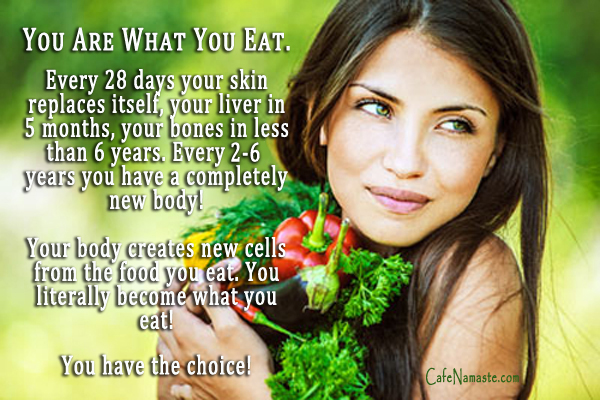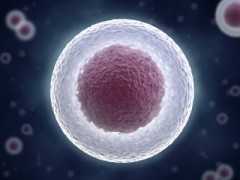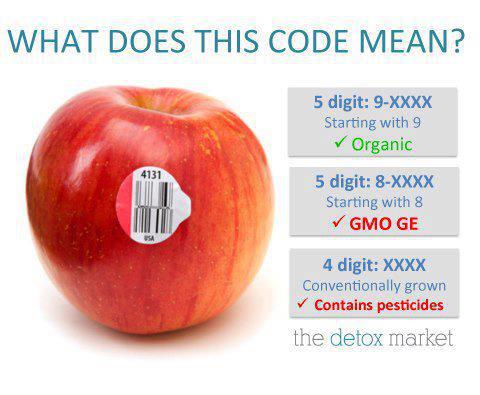The Messages in Our Food
How are GMOs Informing Our Cells?
It is now understood as scientific fact that our genetics are actually regulated by the food we eat. We literally are what we eat!
By Scott Helton
The idea of food and specifically gmos informing our cells may sound a little silly, but let me explain.
First, a little bit about why you should believe it. These findings, after all, are being reported by some of the world’s top researchers and health experts, including one of the greatest minds on the leading frontier of science.
Perhaps you’ve heard of Dr. Bruce Lipton. He was one of the scientific experts interviewed in the indie hit film What The Bleep Do We Know.
Over 45 years ago, Dr. Lipton helped spark the field of science now known as Epigenetics (meaning: above the genes). He’s also written a few best-selling books on his many years of research and ground-breaking discoveries.
The Biology of Belief, is a fascinating look into how our cells’ perception of our environment including from our thoughts, and not our genes, determine our health and experience. This book provides the scientific understanding of exactly how our thoughts and environment dictate our health and physical reality.
His recent book, Spontaneous Evolution with co-author Steve Bhaerman, expands on these core understandings. You’ve heard the saying, “As it is above, so it is below”? This book walks the reader through the new discoveries in science that prove that our biology, society, and the cosmos are inter-connected and inter-related in how they function. The book suggests that we can find answers to complex societal issues by looking at how our body’s 50-75 Trillion cells are harmoniously organized by some obviously divine infinite intelligence. This is a truly incredible feat if you think about how our minds collectively struggle to organize only 7 Billion people on the planet. Now imagine 10,000 Earths, each inhabited by 7 Billion people, and then trying to harmoniously organize everyone to work together to function as a whole. What’s even more mind-boggling, is to realize that’s just one human being in infinite Multi-verses of inter-connected expressions of life. It’s time to move beyond old Newtonian and Darwinian thinking.
Dr. Lipton and other researchers also report that science now proves that the food we eat has a major impact on how our cells produce our body.
Rather than thinking of our bodies as separate individual organisms, we’d be more correct to see them as communities of 60 trillion cells.
Each cell has it’s own digestive, respiratory, excretory, and even nervous system, thereby making them a unique living organism.
Here’s a brief explanation of how our cells are reproduced:
The environment is interpreted/translated by the cell by the messenger molecules it receives, and that perception of the environment is then used to select the genes. Part of the DNA make-up, the “messenger molecules”, known as micro-RNAs (mRNA), alter the read-out of the gene through epigenetic mechanisms, and bind to the chromosomes, which encodes the protein. Genes are merely “blueprints” that can be modified thousands of different ways to produce proteins (the building blocks of our cells).
The important thing to realize is that the DNA of the food we eat is also instructing our cells by selecting how they replicate.
We used to think that when we eat food, the cooking and our digestive system would break it down and our bodies would absorb what they needed. New findings say that the mRNA of the food we eat is picked up by digestive system, and then transferred to our own cells and regulates our own genetics! Dr. Lipton says we now know that these mRNAs are not broken down by our digestive system, but picked up intact from the food, transported through the wall of the gut, and then enter the blood. We alter our own gene expression by the food we eat, and thereby the information we send to our cells.
Conventional Versus Organic?
Most conventional crops, even if not genetically modified are heavily sprayed with herbicides like roundup, or glyphosate. WHO, The World Health Organization (which is known by many to serve corporate interests over public health) even recently listed glyphosate as a probable carcinogen. This information has been known for years by independent researchers and scientists, but suppressed by the industry. It’s also believed to be a major hormone-disruptor causing a wide range of issues.
The frightening thing everyone should be concerned about is that GMOs (Genetically Modified Organisms) are introducing mRNAs (the messenger molecules) that our bodies and planet have never known before. We are unwittingly altering our genetics! We have no idea the consequence of introducing these to our bodies and planet over long periods of time. It’s a dangerous game being played at Life’s expense by companies like Monsanto.
What Foods Are GMO?
The Institute for Responsible Technology says currently commercialized GM crops in the U.S. include:
- soy (94%)
- cotton (90%)
- canola (90%)
- sugar beets (95%)
- corn (88%)
- Hawaiian papaya (more than 50%)
- zucchini and yellow squash (over 24,000 acres).
Products derived from the above, including oils from all four, soy protein, soy lecithin, cornstarch, corn syrup and high fructose corn syrup among others. There are also many “invisible ingredients,” derived from GM crops that are not obviously from corn or soy. Read more
For the BEST source of information about GMO safety, or if you want to convince your loved ones to avoid genetically modified foods check out the champion in the field for public safety on the issue, Jeffery Smith the founder of IRT and leading educator for over 20 years. He’s a passionate and very eloquent speaker that most anyone (with the exception of GMO advocates) will respect.
What You Can Do?
If you can, shop locally. Farmers markets are a great place to get to know the growers of the food you eat. Ask them lots of questions about what seeds they start with, any chemicals they may use, the care they take with their plants and animals, and even if they feed their animals GMO feed (It’s all transferred information). By asking questions you not only build a relationship with them, but you find the farmers whom you want to support and trust to consume their food.
Look into which foods are most important to buy organic, some are more pesticide-laden than others (conventional avocados for example are safe to eat since they don’t require chemicals at all). The current most typical GMO foods are most corn, and most all soy. Avoid un-fermented soy anyway as it promotes estrogen dominance issues in the body. If it says it’s certified organic, it’s supposed to be GMO free.
Of course, growing your own garden is ideal. If you lack space, look into vertical gardening.
It’s your choice of course what you do about this new understanding, but ask yourself this…
Are the choices you are making about what food to buy, supporting a healthy happy life for you and the entire planet?”

Top 21 Powerful Products for Amazing Health
-and-
How to Boost Your Life Force like a Jedi Master
guide book.
An empowering resource and important foundational understanding that may contradict what you’ve been told your entire life. It’s also a great list for trying out some of the top products I’ve found to help you live as your best self.

Grab Your FREE Copy!












2 pings
[…] Yes, even nutrition informs cells through biochemistry and subtle (yet powerful) RNA messages that trigger DNA responses to transform the community of cells that make up our body. Your thoughts, beliefs, and nutrition matter and make a difference. What information are you feeding your cells?1 […]
[…] Yes, even nutrition informs cells through biochemistry and subtle (yet powerful) RNA messages that trigger DNA responses to transform the community of cells that make up our body. Your thoughts, beliefs, and nutrition matter and make a difference. What information are you feeding your cells?1 […]